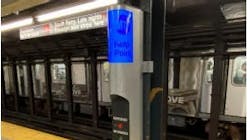New report reveals half of NYC Transit Help Point calls made during six month period were mischief calls
A new report released by Metropolitan Transportation Authority (MTA) Inspector General Daniel G. Cort revealed the results of an audit of the New York City (NYC) Transit Help Point system, a network of 3,016 intercoms across all 472 subway stations that allow the public to report an emergency or request information and assistance.
According to the report, half of the Help Point calls made during a six-month period were deemed mischief calls. The audit also found a significant number of emergency calls were not answered or experienced long delays before being answered. Further, NYC Transit’s practice is to answer calls in the order received without prioritizing emergency calls over information calls. Auditors found that NYC Transit was unaware of the extent of these issues.
NYC Transit has accepted all nine OIG recommendations, including ways to reduce the volume of unnecessary calls, prioritize emergencies and improve call center operations and oversight.
“The Help Point system is important for public safety, and an immediate response to genuine emergency calls is crucial,” Cort said. “This system is in need of significant improvements and I appreciate NYC Transit’s cooperation with our audit and acceptance of our recommendations.”
Installation of the Help Point system, which cost approximately $252.7 million, was completed in 2018. An upgrade is under way as part of an approximately $79.2 million capital project covering multiple communication systems.
The audit covered all Help Point calls made from May 2023 through October 2023. Of the 140,698 total calls, about 28 percent were from customers in need of assistance. Another 22 percent were calls made by agency personnel testing the system and the remaining 50 percent of calls were deemed mischief.
During the audit period, MTA’s Office of Inspector General (OIG) found there were 1,198 unanswered emergency calls made by riders. The MTA OIG notes that records show that riders whose emergency calls were answered were calling to report matters such as an injured passenger, a customer being threatened or harassed or an unauthorized person on the tracks.
The MTA OIG identified several causes for unanswered calls and delays in answering calls, including a technical glitch, a lack of policies and procedures (which MTA auditors recommended addressing in 2016), staffing level fluctuations and the absence of accurate and timely data for managers to assess the performance of the call center and its operators.
The full report can be viewed on MTA OIG’s website.
